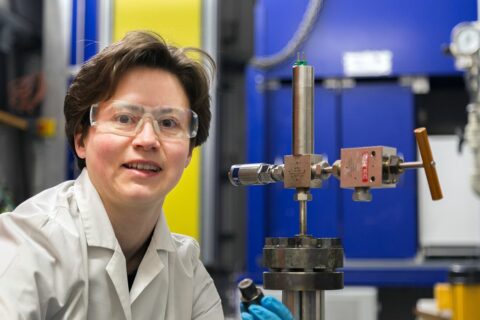Early career researcher at FAU coordinating new DFG priority program

New materials make electronics more energy efficient
The smartphone in your jacket pocket, LEDs for lighting your home and electronics for your charger, solar panels or your electric vehicle all have one thing in common: they depend on semiconductor materials and their properties. Researchers at Friedrich-Alexander-Universität Erlangen-Nürnberg (FAU) are researching how to make such devices more powerful, compact and energy efficient. Dr. Saskia Schimmel from the Chair of Electronic Components at FAU is hoping to achieve a breakthrough with special material properties of new nitrides in order to make electronic components as efficient as possible. She is now responsible for coordinating a new priority program established by the German Research Foundation (DFG).
Dr. Saskia Schimmel has been focusing on nitride semiconductors as a basis for electronic components ever since her doctoral degree in 2018. In these components, electronic properties can be modified in specific areas in order to control the flow of charges. This is the case, for example, with diodes used in solar cells or screens, or also for transistors found in a wide range of different electronic devices, such as computers. “Nitrides, in other words chemical compounds of nitrogen with one or more further elements, are very exciting as a material for applications in electronic components,” Schimmel explains. “As they cover a particularly wide spectrum of properties, they make unique combinations of photonic, electronic, ferroelectric and electrical-optical material properties possible.” When semiconductor materials integrated in a component belong to the same material system, like nitrides in this instance, it is easier to combine different properties.
Technical solutions based on nitrides
Nitride semiconductors are already integrated into certain components, for example gallium nitride. This makes them considerably more efficient. It is thanks to nitride semiconductors that white LEDs have been able to replace traditional light bulbs in many households. In the area of power electronics, used in the electromobility sector, nitrides are increasingly replacing the materials that have been used as standard to date and are boosting performance of the technology at the same time as making it more resource-efficient. In addition to this small group of relatively advanced materials, there are a number of other nitride semiconductors that are promising but have not yet been researched in detail. One new discovery has been made in this area already: In 2019, researchers were able to prove for the first time that certain nitrides have ferro-electric properties. “This discovery means that information can be saved in the form of the material’s polarization state. This could lead to new applications in the area of information technology in the future,” Schimmel explains. Schimmel’s work focuses on potential new opportunities such as these based on nitrides that have not yet been researched in detail.
Optimal component design
The new DFG priority program “Nitrides4Future – New materials and concepts for components” aims to conduct research into the properties of new nitrides and develop optimal component architectures, in other words to design components in a way tailored at exploiting the full potential of the individual materials. According to Schimmel, “the main focus is on improved and new properties of the materials and on how these properties can be used in novel component architectures. Traditional nitride semiconductor technologies offer the ideal basis for efficiently integrating the new functionalities into applications.” Schimmel will coordinate the priority program for the next six years. The other members of the program committee are Prof. Dr. Oliver Ambacher (Albert-Ludwigs-Universität Freiburg), Prof. Dr. Jürgen Christen (Otto-von-Guericke-Universität Magdeburg), Prof. Dr. Stefanie Kroker (Technische Universität Braunschweig) and Prof. Dr. Bernd Witzigmann (FAU).
About DFG priority programs
In the funded programs, researchers investigate topics that have the potential to have a formative impact on a field of science or the humanities, for example if they discover new research areas or open up new approaches and perspectives in a known field of research. Researchers from different locations and different disciplines come together to work in the priority programs. In the coming months, the DFG will issue calls for applications for the individual programs, hoping to spark researchers’ interest in becoming involved. The DFG will then assess the submitted funding applications in terms of their scientific standard and their contribution to the main topic.
Further information:
Dr. Saskia Schimmel
Chair of Electronic Components